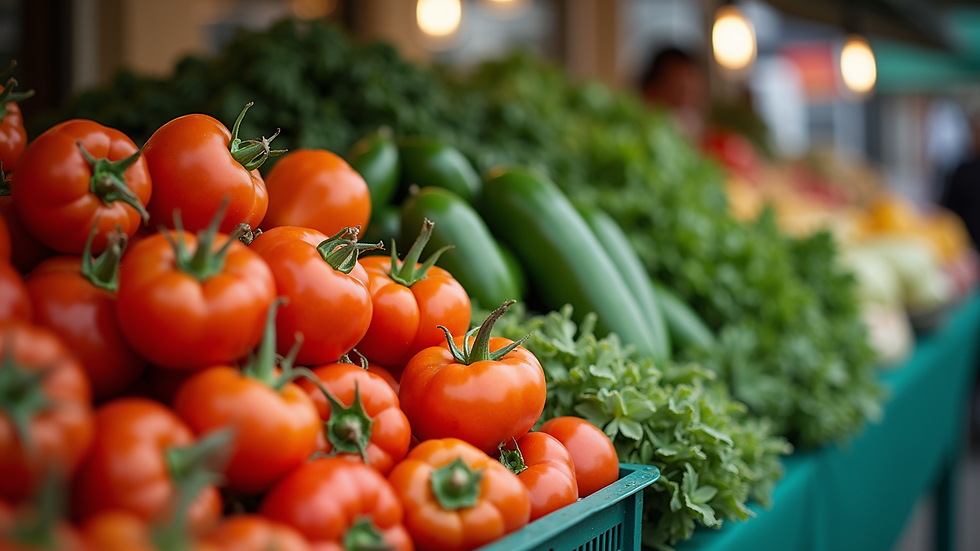Organic Farming Benefits for Health and Sustainability
- Farm earth
- Oct 13, 2025
- 3 min read
Organic farming has gained significant attention worldwide as a sustainable and health-conscious approach to agriculture. This method emphasizes natural processes, avoiding synthetic chemicals, and promoting biodiversity. Understanding the organic farming advantages can help consumers and farmers make informed decisions that benefit both personal health and the environment.
Understanding Organic Farming Advantages
Organic farming is a method of growing crops and raising livestock without synthetic pesticides, fertilizers, genetically modified organisms (GMOs), or antibiotics. Instead, it relies on natural inputs and processes such as crop rotation, composting, and biological pest control. This approach offers several advantages:
Environmental Protection: Organic farming reduces pollution and conserves water and soil quality.
Biodiversity Enhancement: It encourages a variety of plants and animals, supporting ecosystem health.
Soil Fertility: Natural compost and crop rotation improve soil structure and nutrient content.
Reduced Chemical Exposure: Farmers and consumers avoid harmful synthetic chemicals.
Sustainable Practices: Organic farming supports long-term agricultural productivity.
These advantages contribute to a healthier planet and promote sustainable food production systems.

How Organic Farming Supports Health and Environment
Organic farming benefits extend beyond the farm to impact human health and the environment positively. Here’s how:
Health Benefits
Organic foods are often richer in certain nutrients, including antioxidants, vitamins, and minerals. They are free from synthetic pesticides and fertilizers, which can leave harmful residues on conventionally grown produce. Consuming organic products reduces exposure to these chemicals, which have been linked to health issues such as allergies, hormone disruption, and even certain cancers.
Moreover, organic livestock farming avoids the use of antibiotics and growth hormones, reducing the risk of antibiotic resistance and chemical residues in meat and dairy products.
Environmental Benefits
Organic farming practices help maintain soil health by increasing organic matter and microbial activity. This leads to better water retention and reduced erosion. The absence of synthetic chemicals means less contamination of water bodies and reduced harm to beneficial insects like bees and earthworms.
Additionally, organic farms often use renewable resources and recycle waste, lowering their carbon footprint. By promoting biodiversity, organic farming creates resilient ecosystems that can better withstand pests and climate change.

What are 10 Benefits of Organic Food?
Organic food offers numerous benefits that appeal to health-conscious consumers and environmental advocates alike. Here are ten key benefits:
Higher Nutritional Value: Organic fruits and vegetables often contain more vitamins, minerals, and antioxidants.
No Synthetic Chemicals: Free from pesticides, herbicides, and synthetic fertilizers.
Better Taste: Many people find organic produce fresher and more flavorful.
Supports Animal Welfare: Organic livestock farming provides animals with better living conditions.
Reduces Antibiotic Resistance: Avoids antibiotics in animal rearing, lowering resistance risks.
Protects Water Quality: No chemical runoff contaminates local water sources.
Promotes Soil Health: Organic practices improve soil fertility and structure.
Supports Biodiversity: Encourages a variety of plants, insects, and wildlife.
Reduces Carbon Footprint: Organic farms often use less energy and produce fewer greenhouse gases.
10. Encourages Sustainable Farming: Helps maintain agricultural productivity for future generations.
These benefits make organic food a compelling choice for those seeking healthier diets and a cleaner environment.

Practical Tips for Supporting Organic Farming
Supporting organic farming can be simple and rewarding. Here are some actionable recommendations:
Buy Certified Organic Products: Look for trusted organic labels to ensure authenticity.
Shop Local: Purchase from local organic farmers’ markets to support community agriculture.
Grow Your Own Organic Garden: Start small with herbs or vegetables using organic methods.
Reduce Food Waste: Plan meals and store food properly to minimize waste.
Advocate for Organic Farming: Support policies and initiatives that promote organic agriculture.
Educate Yourself and Others: Learn about organic farming benefits and share knowledge with friends and family.
By making conscious choices, consumers can contribute to the growth of organic farming and its positive impact on health and sustainability.
Embracing Organic Farming Benefits for a Better Future
The shift towards organic farming is more than a trend - it is a necessary step for ensuring a healthier planet and population. The organic farming benefits include improved food quality, environmental protection, and sustainable agricultural practices that can feed future generations without depleting natural resources.
Farmers adopting organic methods often experience improved soil health and reduced input costs over time. Consumers enjoy safer, more nutritious food options. Together, these advantages create a cycle of positive change that supports both human well-being and ecological balance.
Choosing organic is a commitment to health, sustainability, and responsible stewardship of the earth. By understanding and embracing the organic farming advantages, individuals and communities can foster a more resilient and vibrant food system.



Comments